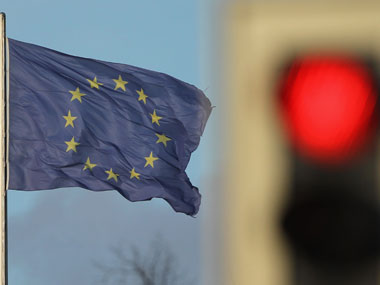Russian Foreign Minister Sergei Lavrov told EU foreign policy chief Catherine Ashton that an EU-brokered agreement signed on 21 February should be the basis for stabilising the situation in Ukraine, the ministry said on Wednesday. [caption id=“attachment_1420065” align=“alignleft” width=“380”]  An encouraged EU is hoping for a resolution of the conflict in Ukraine a day after Russia assured that there would be no military intervention. Getty.[/caption] In a statement, Russia’s Foreign Ministry said at a meeting on Tuesday “Lavrov emphasised that the normalisation of the situation in that country should be based on the founding principles of the agreement about regulating the crisis in Ukraine on February 21”. He said the agreement foresaw constitutional reform which would take into account the wishes of all regions in Ukraine. Meanwhile, European governments have stepped up diplomatic efforts to de-escalate the crisis in Ukraine, encouraged by Russian President Vladimir Putin’s assurance that Russia had no intention of annexing the Crimean peninsula, or to wage a war against its neighbour. At a news conference with a group of Russian journalists in Moscow on Tuesday, Putin denied that Russia had intervened militarily in Crimea, and claimed that hundreds of heavily-armed troops guarding the autonomous region’s military bases and other key installations were local self-defence forces loyal to Russia. Putin also welcomed German Chancellor Angela Merkel’s initiative to set up an international “contact group” on Ukraine to resolve the crisis. He said he had asked foreign minister Sergei Lavrov to meet his German counterpart Frank-Walter Steinmeier on Wednesday to explore the possibilities for such a mission. Steinmeier, who held discussions with Lavrov in Geneva on Monday, expressed optimism that the conflict between Russia and Ukraine could be resolved through diplomatic means. If an understanding can be reached on setting up a “contact group” on Ukraine with the participation of Russia, it could help de-escalate the crisis, he said. Diplomatic efforts are under way to reach a broad agreement on this proposal within the next 48 hours so that the heads of state and government of the EU can give their final approval when they meet for an emergency summit in Brussels tomorrow, Steinmeier had said. “There is a small chance to initiate a diplomatic process with which the conflict between Russia and Ukraine and the crisis on the Crimean peninsula could be resolved,” he said. He also hoped that progress in this area could also eliminate the need for the EU to impose sanctions on Russia. “Europe is facing the threat of a new division and time is running out to de-escalate the crisis,” said Steinmeier who is scheduled to meet meet Lavrov, US Secretary of State John Kerry and several other foreign ministers at the international Lebanon Conference in Paris today. The present crisis was sparked by a build-up of Russian forces in Crimea amid concerns that Russia may also send troops to Russian-speaking eastern Ukraine. Military mission to Ukraine Meanwhile, the Organisation for Security and Cooperation in Europe (OSCE) based in Vienna decided last evening to send a military observer mission to Ukraine. The mission will travel to Ukraine today on an invitation from the country’s new transitional government, the OSCE said. EU foreign ministers on Monday warned Russia that in the absence of steps to de-escalate the crisis, they would impose “targeted sanctions”, including the suspension of negotiations on visa liberalisation and on an agreement on all aspects of EU-Russia relations. Tomorrow’s summit has been convened to approve these and other sanctions against Russia. Reuters and PTI
European governments step up diplomatic efforts to de-escalate the crisis in Ukraine, encouraged by Putin’s assurance that Russia does not intend annexe Crimea or go to war
Advertisement
End of Article
Written by FP Archives
see more


)

)
)
)
)
)
)
)
)



